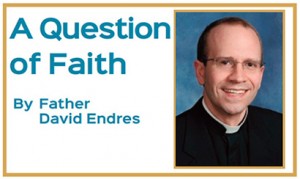Question of Faith: Do we still believe in “limbo”?
 Question of Faith
Question of Faith
Q: Back in the day, we were taught there was a “limbo” where infants went if they died before baptism. Does the church still teach that?
A: As you mentioned, limbo, from the Latin word for “border,” was a theological hypothesis to explain the fate of unbaptized infants. Rather than entering either heaven or hell, some believed these souls after death were brought to a place of no pain or suffering, a state of natural happiness, yet a place without God. It was reasoned that thought these souls had not committed sin, neither had original sin been removed, depriving them of the “beatific vision” (being face to face with God).
The idea of limbo was a speculative theory derived in part from belief in the necessity of baptism. Since baptism is ordinarily necessary for entering eternal life, if baptism were omitted, it was thought that happiness forever with God would not be possible. It was an early tradition of some of the fathers of the church, particularly the fourth century theologians St. Gregory Nazianzus and St. Augustine, that infants dying without baptism would neither be admitted to the glory of Heaven nor condemned to suffer punishment. Having done no wrong in this life, they would experience a neutral state, free from any pain or punishment. While such a view may seem harsh, for some it was understood as a comfort: that while not baptized, none who died as children would experience the pains of hell.
Despite further theological speculation in the Middle Ages through the modern period, limbo was never an official doctrine of the church, though it was commonly taught and held. Cardinal Joseph Ratzinger, the future Pope Benedict XVI, commented in 1984 that limbo was only a hypothesis. In 2005, the International Theological Commission, composed of experts from around the world, took up the question of limbo. Two years later, the commission concluded, “There is greater theological awareness today that God is merciful and wants all human beings to be saved. Grace has priority over sin, and the exclusion of innocent babies from heaven does not seem to reflect Christ’s special love for the little ones.”
While some would argue that this means baptism is not essential for eternal life, the importance of baptism and the mercy of God are not opposed. Jesus’ words, “Amen, amen, I say to you, no one can enter the kingdom of God without being born of water and Spirit” (John 3:5), remain a reminder of the necessity of baptism. Yet, the mercy of God is certainly not bound by baptism. Instead, the church recognizes humanity’s limitations in understanding the mystery of God and redemptive power of the divine. And likewise, the church acknowledges that sometimes it is not possible for an infant to be baptized before death, even if the parents desire the sacrament for their child. In this case, no one is culpable for the failure to baptize, especially the child.
Since limbo has never been official teaching of the church, there is no obligation to believe in it. The fate of all the unbaptized, including infants, is left to the mercy of God. But we have the hope of Jesus’ words, “Let the children come to me; do not prevent them, for the kingdom of God belongs to such as these” (Mark 10:14), which allow us confidence in the salvation of children who have died without the saving effects of baptism.
Father Endres is dean of Mount St. Mary’s Seminary of the West and the Athenaeum of Ohio. Send your question of faith to [email protected].
Father Endres is editor of the academic journal “U.S.Catholic Historian.” This fall he began writing a column for another Catholic publication – see page 22 for more.













